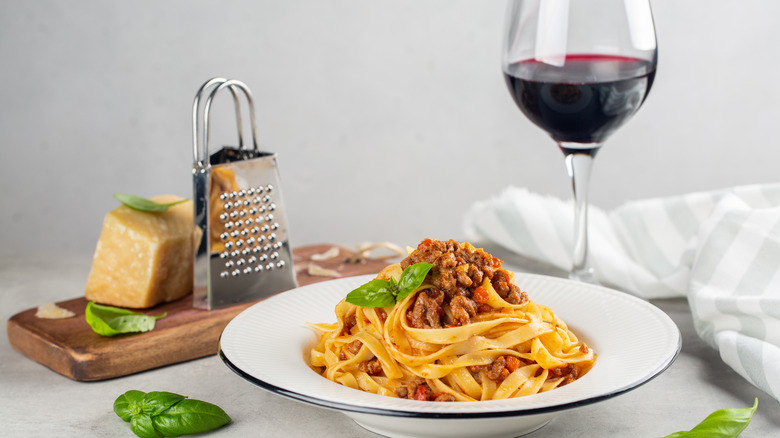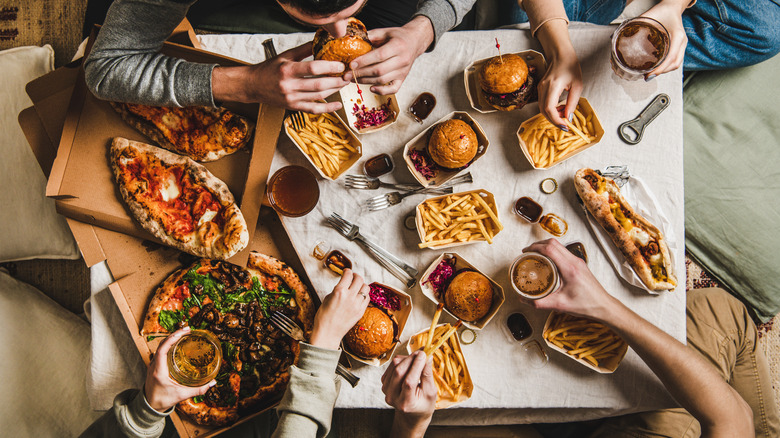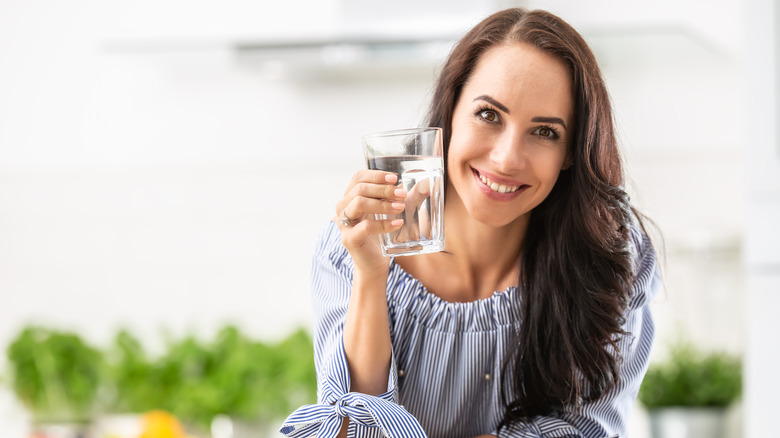Here's Why You Get So Hungry When Drinking Alcohol
Kicking back with a nice glass of wine after a long day or enjoying a cold beer at a weekend barbecue sure can hit the spot. If you enjoy alcohol socially and indulge every now and then, enjoying a nice drink can be a way to relax and savor the flavor of your favorite beverage. In fact, drinking wine has its benefits and has been tied to better gut, heart, and brain health.
While having an occasional drink may be healthy, drinking too much comes with its share of risks, like the danger of becoming addicted, high blood pressure, and a variety of cancers (via CDC).
Yet even when drinking responsibly, alcohol can have some negative effects. For example, alcohol can affect your looks. It ages you faster than you think and fosters more fine lines and wrinkles because it dehydrates you. It can also leave you feeling cranky, bloated, and ever so hungry. Here's why you get so hungry when you drink.
Excessive drinking lowers your inhibitions
One reason you may feel ravenous when drinking is that alcohol lowers your inhibitions, causing you to do things you wouldn't normally do, such as overindulging in food. You may also eat foods that you normally wouldn't. It doesn't help that many times when you're drinking, you're at a restaurant or out with friends and so much tasty food is readily available.
However, the reason behind your hunger when you drink is biological. According to Healthline, when alcohol is ingested, there are brain neurons that become more activated. That results in becoming more hungry as your body fervently tries to satiate the hunger and give the brain what it thinks it needs. In essence, when you reach the point of being drunk, your brain thinks it's starving and amps up your hunger cues.
Registered dietitian Ginger Hultin explained to CNN, "Instead of the body recognizing 'I just got a lot of calories, so I have fuel and I'm full,' the opposite occurs. Though calories have been ingested, the brain is triggering more food intake."
In addition, alcohol lowers your blood sugar which in turn can cause you to seek out carbs and sugars to replenish that loss.
How to not overeat when you drink
The key to maintaining most healthy habits often has to do with planning, and this is no exception. When you know you're going to drink, instead of skipping meals so you can avoid the calories from alcohol (which is never a good plan), you should have a sustainable and balanced meal with protein, veggies, and carbs.
After a healthy meal, set your intentions for the night — essentially focus on not being hungover the next morning. Registered dietitian Suzanne Dixon said, "If you go out thinking, 'I'm going to have a great time with friends, have a couple of drinks, and make it to the gym tomorrow morning,' you are less likely to succumb to the peer pressure to have much more alcohol than you'd like" (via Healthline).
Of course, water should be your best friend. Dr. Kathryn O'Sullivan told Cosmopolitan, "Aim to drink at least two liters of water during the day," and also suggested drinking a pint of water at dinner.
Since alcohol dehydrates, alternating a glass of water with an alcoholic beverage will not only slow down your rate of intoxication but can help prevent you from becoming parched.


